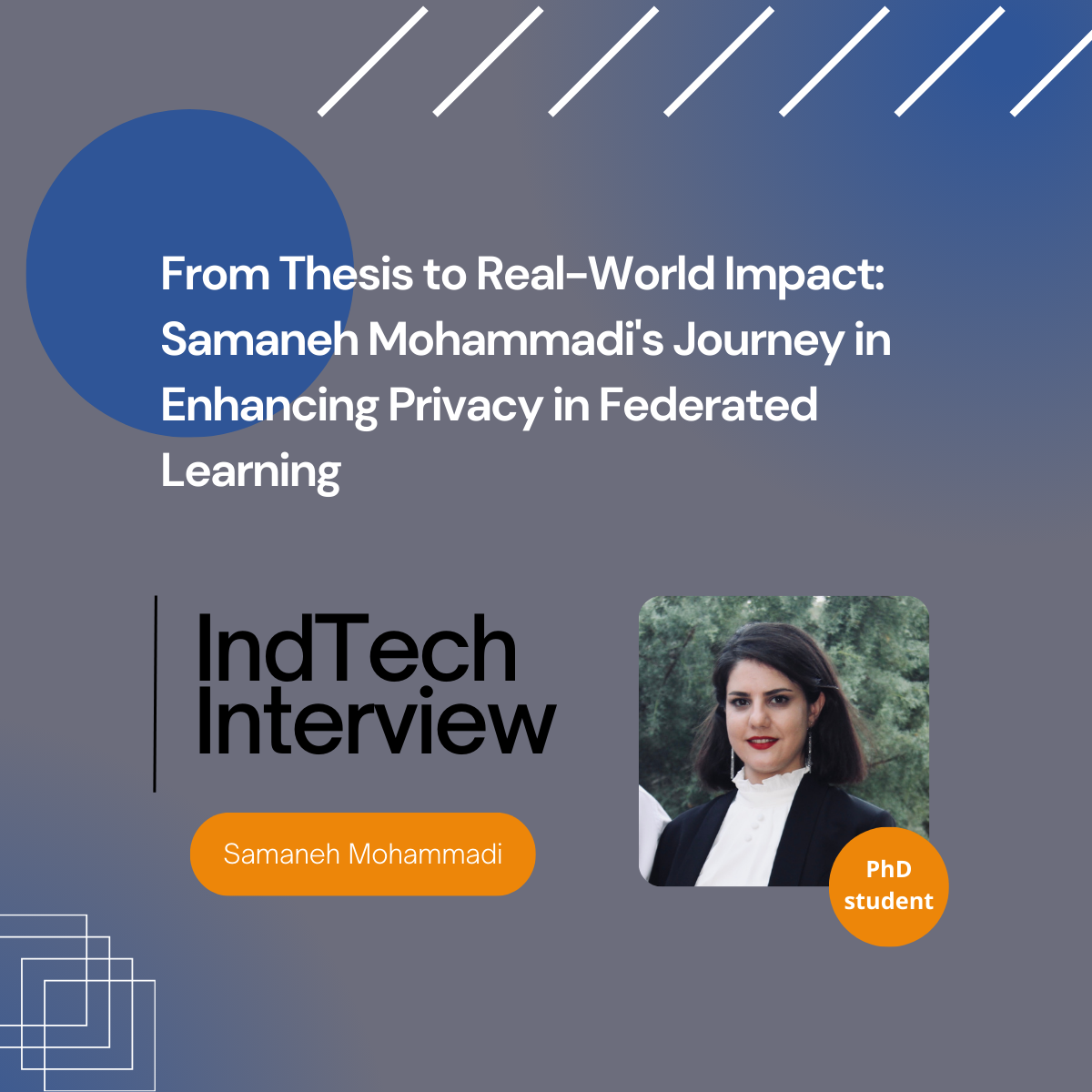From Thesis to Real-World Impact: Samaneh Mohammadi' s Journey in Enhancing Privacy in Federated Learning
Samaneh Mohammadi is a pioneer in the intersection of privacy and performance optimization in emerging applications of federated learning, moving from academic exploration to real-world impact. At the heart of her contributions lies her licentiate thesis, titled “Balancing Privacy and Performance in Emerging Applications of Federated Learning,” a work that roots into the dynamic landscape of machine learning, specifically highlighting federated learning as a pioneering approach. In this in-depth interview, Mohammadi navigates through the layers of her research journey, where she intricately addresses the challenges posed by privacy concerns in the evolving field of speech emotion recognition.
Samaneh Mohammadi’s work not only contributes to the academic discourse but envisions tangible applications in our daily lives. As we explore the practical implications, envisioning enhanced privacy in voice-activated assistants and personalized mental health applications, federated learning allows multiple devices to train a machine learning model without sharing private data with a central server. This approach improves privacy and has many applications, including speech-emotion recognition. Samaneh’s thesis aims to propose privacy-preserving techniques for speech emotion recognition within the federated learning framework while addressing performance challenges.
The research journey involves a comprehensive exploration of existing privacy methods, the design of an optimized setup for federated learning in speech emotion recognition, the development of privacy-preserving methods, and the evaluating of their integration. The ultimate objective is to strike a delicate balance between privacy and performance preservation, empowering engineers to make informed trade-offs while minimizing communication and computation overhead.
Moving beyond the academic context, Samaneh envisions the practical application of her findings in various facets of everyday life. For instance, her research can contribute to enhanced privacy in voice-activated assistants like Siri, Alexa, or Google Assistant, allowing these devices to better understand and respond to users’ emotions without compromising the privacy of sensitive speech data. In the realm of mental health applications, incorporating privacy-preserving speech emotion recognition can lead to more effective and personalized support apps, ensuring the confidentiality of user data. Similarly, in media recommendations, streaming platforms can leverage privacy-preserving techniques to understand users’ emotional responses without directly accessing individual speech data, providing more accurate and personalized content recommendations.
The project focuses on crafting a distributed AI solution for edge and end devices to enhance data security and expedite processing while preserving data locally.
Samaneh’s inspiration to delve into the intersection of privacy and performance in federated learning applications, particularly within the context of speech emotion recognition, stems from her involvement in the DAIS European project at RISE. The project focuses on crafting a distributed AI solution for edge and end devices to enhance data security and expedite processing while preserving data locally. Specifically, her contribution revolves around advancing the development of private and decentralized media recommendations, integrating users’ emotional states into the recommendation process.
Mohammadi’s research career in the DAIS project focused on privacy-preserving federated learning in speech emotion recognition. She addressed the challenges of deploying privacy mechanisms while maintaining performance in a real-world application in her licentiate thesis. Her work aims to mitigate privacy risks by keeping sensitive user data on individual devices during the training process, enhancing privacy and security for users interacting with voice-activated systems.
The researcher introduces several privacy-preserving solutions with general applicability, including homomorphic encryption for speech emotion recognition. This encryption technique facilitates the processing of encrypted voice data without disclosing raw audio, preserving speaker privacy. Differential privacy, another protective measure, introduces noise to emotion data during analysis, safeguarding individual speaker identities while extracting meaningful patterns for emotion recognition.
In simple terms, Samaneh explains the ways she ensured privacy in the optimized federated learning setup for Speech Emotion Recognition. This involves integrating privacy-preserving mechanisms like Differential Privacy and Homomorphic encryption, striking a balance between maximizing privacy and maintaining the accuracy and efficiency of emotion recognition. “Homomorphic encryption, for instance, is a privacy-preserving solution suitable for Speech Emotion Recognition. It facilitates the processing of encrypted voice data for emotion recognition without disclosing the raw audio, thus preserving speaker privacy”, she states.
“I hope people take away the message that advanced technological solutions, such as emotion recognition from speech, can be developed in a privacy-preserving manner”
The significance of Samaneh’s research to someone outside the machine learning field is described as developing a way to teach computers to understand human emotions from speech while respecting and protecting people’s privacy. The analogy involves envisioning a phone understanding emotions from voice without compromising the privacy and security of emotional data.
“I hope people take away the message that advanced technological solutions, such as emotion recognition from speech, can be developed in a privacy-preserving manner”, she declares. Her work emphasizes that privacy doesn’t need to be sacrificed for convenience or technological advancement, and with careful design and the right techniques, both can be achieved.
“Navigating challenges involves trial and error, collaboration, and staying abreast of the latest advancements in the field”
In providing insights into her routine at RISE, Samaneh shares that her daily work “involves staying updated on the latest studies, coding and testing new privacy-preserving algorithms, collaborating with her research team, and writing up results for publication. Navigating challenges involves trial and error, collaboration, and staying abreast of the latest advancements in the field.”
Samaneh’s routine work at RISE focuses on collaborating with a team of researchers, particularly within the DAIS project. “Being part of this research team adds value to my personal branding by associating me with cutting-edge research and innovation in privacy-preserving technologies. It’s a dynamic environment where I’m constantly learning and contributing to projects that have the potential to make a significant impact on society”.
In a nutshell, Samaneh’s work is a breakthrough in teaching computers to understand human emotions from speech while respecting and protecting people’s privacy. Her research emphasizes that privacy doesn’t need to be sacrificed for convenience. Her work inspires more people to consider the importance of safeguarding their data and appreciate the advancements in privacy-preserving technologies.
RISE is an independent, state-owned research institute. As an innovation partner for the entire society, we help develop technologies, products, services and processes contributing to a sustainable world and competitive industry. We do this in collaboration with and on behalf of the academia, private and public sector. We also have a particular focus on supporting small and medium-sized companies in their innovation processes.

